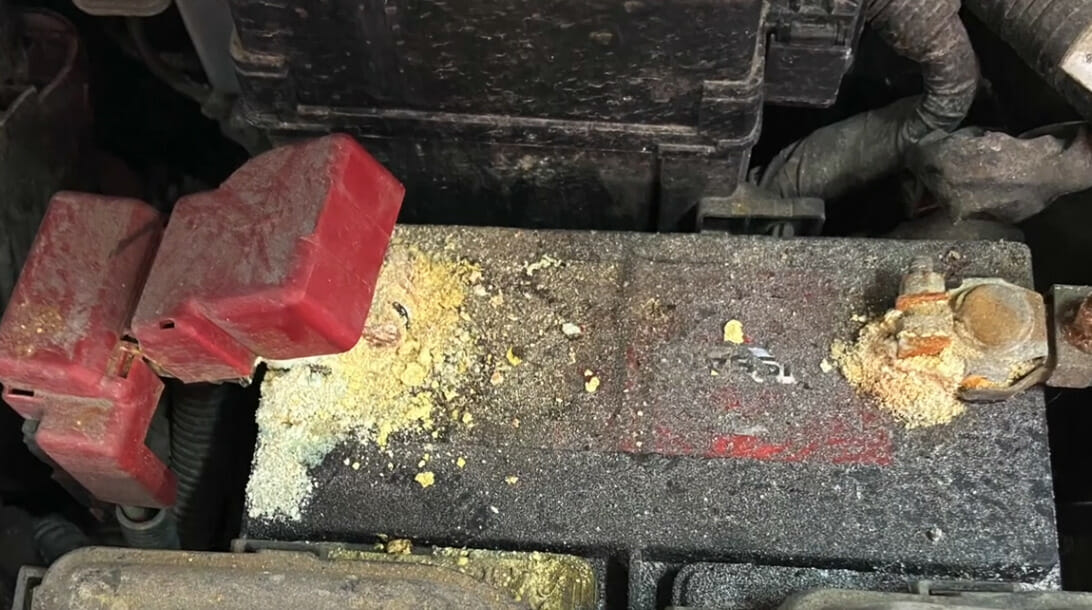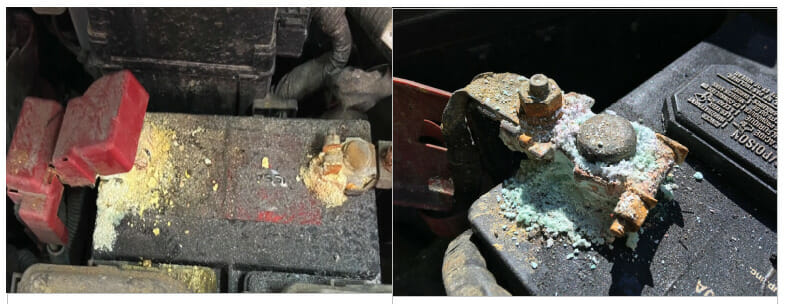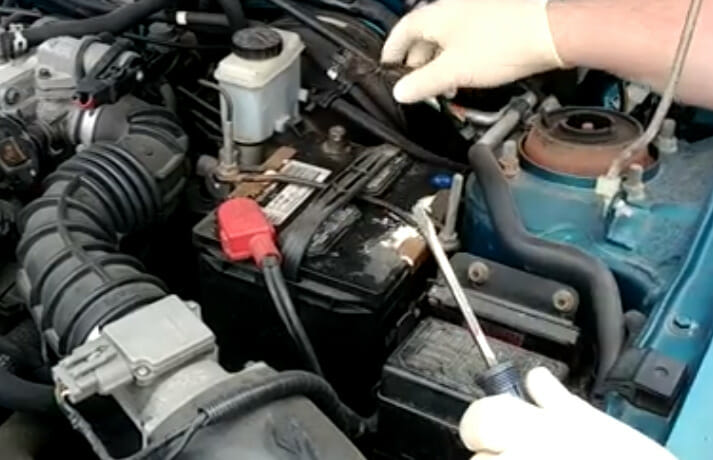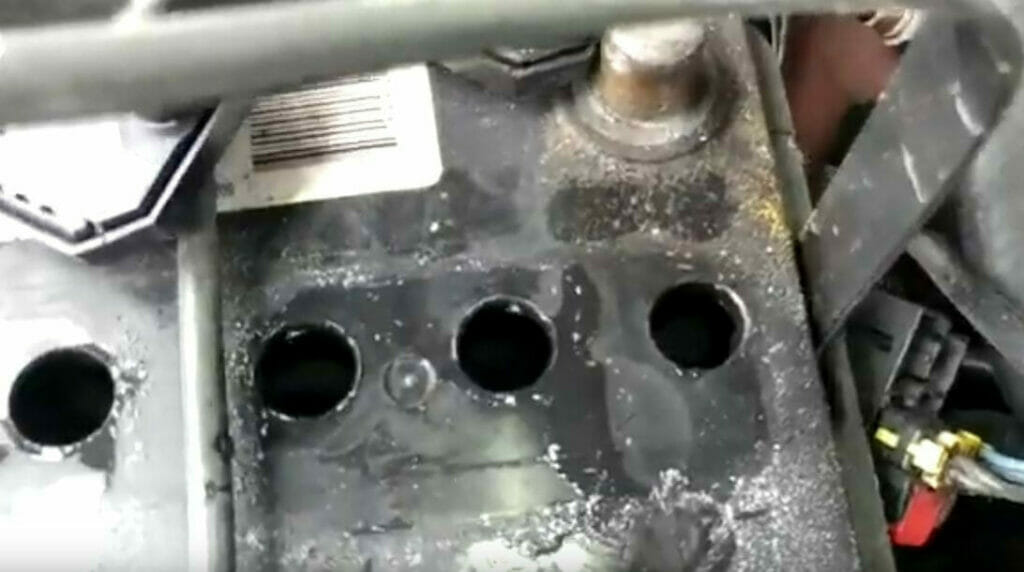Is it Safe to Drive with a Leaking Battery?

Don’t be tempted to drive if your vehicle has a leaking battery.
It doesn’t matter whether the leakage is minor or major. Let me be clear about this: don’t drive with a leaking battery.
No, it is not safe to drive with a leaking battery at all. It is very dangerous to do so. The leaking battery acid can damage the car and the environment. You would also be risking your own life, including any passengers. The battery can melt metal parts of the engine and chassis; if it explodes, it can cause a fire and toxic fumes. Don’t touch the leaking acid, either.
You should stop driving immediately if you spot or suspect the battery is leaking. I’ll explain this further.
Why a Leaking Battery is Dangerous
A leaking battery is dangerous because of the highly corrosive sulfuric acid coming out.
A lead-acid battery contains lead and lead dioxide, dangerous heavy metals. But the electrolyte is a highly corrosive liquid that starts disintegrating anything it comes into contact with. This includes the vehicle’s engine, its chassis, and anything else it falls onto.
The more concentrated the acid, the more corrosive it will be. The acid corrodes whatever it comes into contact with through oxidation, including metal and concrete, except for plastic, hence the plastic casing.
Not only should you refrain from driving, you shouldn’t touch the leaking acid, either. You could burn your hands if you did.
Moreover, the battery acid can also create a flammable gas if it reacts with water and metal, causing an explosion and fire. Even inhaling the fumes can cause difficulty breathing, severe internal burns, and death.
What Causes a Car Battery to Leak?
By knowing what causes a car battery, typically a lead-acid type, to leak, you can prevent it from happening and the serious further risks it can cause.
Damaged Battery
The battery might be leaking because of a severely damaged battery:
- The battery is new and was damaged during transportation or handling. Return it to the battery seller if it’s still under warranty.
- A tool or some other item smashed into its side during repair work. Please don’t use it.
- Your vehicle was involved in an accident, damaging the battery. Don’t use it.
- You regularly drive along bumpy roads and over potholes. The vibrations have ultimately damaged the battery. Please don’t use it.
Lead-acid batteries in moving vehicles endure many vibrations, despite using vibration isolators, dampeners, and suspension systems. Continuous and heavy vibrations are not good for any vehicle. If the battery is not secure, it can easily get dislodged, and if the caps are not tight, they can come off as well.
The vibrations can wear down the battery to create potential leak points.
Other Causes
The battery might be leaking due to some other reason:
- The battery was overcharged, as charging activates the sulfuric acid, and too much gas pressure inside can cause the battery to bulge or crack. Either it was left on charge for too long, or you applied a too-high charging current. The battery must be reconditioned. Use a smart charger next time.
- The electrolyte level is too high. The battery will struggle to hold a charge if it’s too low but can leak if it’s too high, in which case, keep the caps open to let some evaporate or use a tool to remove it.
- The ambient temperature is too high. Cool the surroundings.
- The battery’s terminals are loose or damaged. Loose terminals can usually be fixed by tightening them, but not if damaged.
- The battery is very old or past its lifespan (3-5 years) and leaks due to natural wear and tear.
If the battery leaks due to a cause other than severe damage, you might be able to take some corrective action, depending on the severity of the leak.
How Can I Tell the Battery is Leaking?
Whatever the cause of the leakage, you’ll know the battery acid is leaking if you notice a liquid on or around the battery, fumes or a smell, or signs of corrosion.
What might start as a small crack can eventually widen and turn into a hole, eventually causing the battery acid to leak? Even if you see such a small crack, you should consider it serious to prevent it from developing into a more serious problem.
Regularly inspect the battery for signs of cracks, swelling, bulging, warping, and leakage, including the bottom. Don’t use the battery in either case. It must be replaced and the damaged battery recycled.
Ask an auto-electrician to check the battery if you suspect the battery is leaking but are unsure.
Corrosion on a Battery’s Terminals
Don’t confuse corrosion on a battery’s terminals for a leaking battery unless wet.
Corrosion on a battery’s terminals is a far more common problem than acid leakage, as it happens naturally in the presence of moisture. Still, it can obstruct current flow and, if left untreated, weaken the plastic and seal points around the terminals. Eventually, this can damage the battery and form tears and cracks, creating paths for the acid to leak.
Always clean the corrosion on your vehicle battery’s terminals whenever it forms.
To clean the terminals effectively, disconnect the cables from the terminals, clear the corrosion with a tool, then use a water solution with either soap or baking soda. Afterward, clean the terminals with a dry cloth and apply some petroleum jelly before reconnecting the cables.

What to Do with a Leaking Battery
You know clearly by now that you should not drive with a leaking battery.
Rather, you should stop the car immediately because driving with a leaking battery is unsafe. But what else should you do?
If You Suspect a Leaking Battery
If you suspect the battery is leaking, inspect it thoroughly and don’t drive until you can confirm there is no leakage.
See the earlier section: How Can I Tell the Battery is Leaking?
If You Spot a Leaking Battery
If you see that your vehicle’s battery is leaking, then the situation is severe, and you should not drive at all.
Depending on your particular situation, you should:
- Replace the battery immediately and carefully with a good and healthy one.
- Have your car towed.
- Call an auto-mechanic.
If the leakage appears minor, you might have some time to take the right action to prevent it from becoming more dangerous. Otherwise, take the leaking battery to a battery recycling center.
What if the Car Turns On?
Just because a car can still turn on with a leaking battery doesn’t make driving safe.
Rather, driving a car in that condition would be very dangerous. The battery will heat up, causing the chemicals to create an explosion. Even if that doesn’t happen, the car will eventually stall and be unusable. Besides that, you will be risking your life.
So, to re-emphasize the point, don’t drive a car with a leaking battery.
Fixing a Leaking Battery
Major Leaks
There’s no safe fix for a severely leaking battery.
The only safe solution is to replace it. It is simply cleaning the acid off if not enough because it won’t deal with the source of the leak or seal the leak point. If you have to clean acid drips off other parts of the car, you should wear rubber gloves. But don’t risk trying to patch a crack or hole in the battery, either. It won’t stop the leak.
Just send the battery off for recycling and attach a new one. This is the only option if it’s a major leak, severely damaged, or the battery is near or past its lifespan.
Minor Leaks

If the leak is minor and you must drive somewhere urgently, assess the situation.
As long as you’re sure it is minor and can be fixed easily, driving is unavoidable, and you cannot change the battery immediately; you can attempt to fix the minor leak. But only leaks from the top can be fixed this way, not if they’re from the sides or the bottom.
Put on protective gear (eye goggles, rubber gloves, and extra clothing) and clean the area first. Putting baking soda over the leak can help to neutralize the acid. Add more baking soda if you see bubbles forming.
A Minor Leak from the Top
Tighten the terminals and use a battery sealant to fix a minor leak from the top.
A Too-High Electrolyte Level
You have two options if the electrolyte level is too high.
If it’s only a little too high, keep the caps open to let some of it evaporate. But if this fails to work soon enough or the level is too high, use a syringe or turkey baster to remove it quickly.

Too-High Ambient Temperature
If the ambient temperature is too high, cool it down.
Ensure the radiator works effectively, and open the hood to let the engine cool. Avoid parking the car in a hot spot.
Overcharged Battery
An overcharged battery must be reconditioned.
It will involve removing the electrolyte, replenishing it anew, or using a smart charger to send high-frequency pulses in reconditioning mode.
In an Emergency
If you ever need to fix a leaking battery in an emergency and you’re stranded somewhere, I’ll tell you what to do.
Since we have no choice but to apply a temporary fix, we’ll do just that, but this will only work if you have enough electrolytes and is only feasible if the leak is not severe. First, clean the area and then turn the engine off.
Get anything available to fill the crack, such as superglue, epoxy, JB Weld, or other substitutes. Even cling wrap, plastic sheets, and duct tape can do in an emergency.
If you smell the battery acid again while driving or you notice that the engine is overheating, pull over and re-inspect the battery. Clean the battery again, if necessary, and re-patch over the exact leak point.
Hopefully, you can continue driving to a safe place and have the battery changed at the earliest opportunity.
References
Video References
Louison Automotive Inc.
The Broken Life
